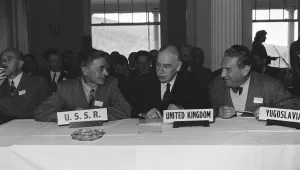International Security is America's leading peer-reviewed journal of security affairs.
Summary
Efforts to understand Saddam Hussein’s strategic thought have long been hampered by the opacity and secrecy of the Baathist regime. Newly available, high-level Iraqi archival documentation demonstrates that in the late 1970s and early 1980s, Saddam viewed nuclear weapons through a fundamentally coercive, revisionist lens. He had long hoped to wage a grinding war of attrition against the Israeli state, and he believed that Iraqi acquisition of the bomb would neutralize Israeli nuclear threats, force the Jewish state to fight at the conventional level, and thereby allow Iraq and its Arab allies (with their larger economic and population base) to prosecute a prolonged war that would displace Israel from the territories occupied in 1967. These findings have implications for the existing theoretical literature on the causes and consequences of nuclear proliferation, as well as for the growing body of work on “nuclear alarmism.” The Iraqi case undermines the thesis that states proliferate primarily because of defensive concerns. Saddam certainly viewed possession of the bomb as a means of enhancing Iraq’s security, but his attraction to nuclear weapons revolved around offensive objectives. Saddam hoped to exploit the deterrent balance with Israel to initiate a bloody conventional war that would have likely been immensely destructive and destabilizing for the Middle East as a whole. In other words, though Saddam never obtained nuclear weapons, his views on their potential utility give good cause for both pessimism and alarm.
Hal Brands and David Palkki, "Saddam, Israel, and the Bomb: Nuclear Alarmism Justified?" International Security, Vol. 36, No. 1 (Summer 2011), pp. 133-166
The full text of this publication is available in the link below.



